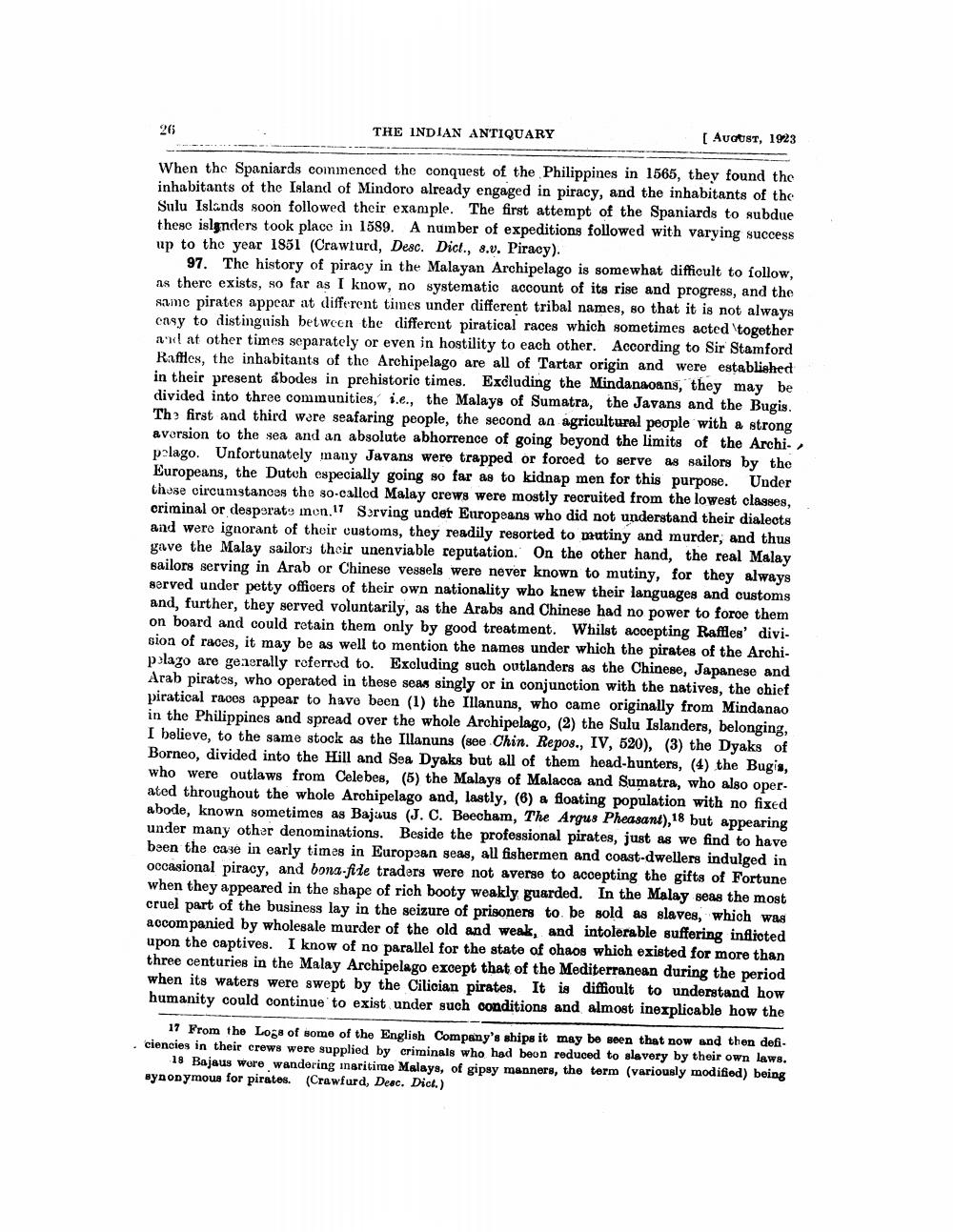________________
26
THE INDIAN ANTIQUARY
[ August, 1923
When the Spaniards commenced the conquest of the Philippines in 1565, they found the inhabitants of the Island of Mindoro already engaged in piracy, and the inhabitants of the Sulu Islands soon followed their example. The first attempt of the Spaniards to subdue these islanders took place in 1589. A number of expeditions followed with varying success up to the year 1851 (Crawfurd, Desc. Dicl., 8.0. Piracy).
97. The history of piracy in the Malayan Archipelago is somewhat difficult to follow, as there exists, so far as I know, no systematic account of its rise and progress, and the same pirates appear at different times under different tribal names, so that it is not always casy to distinguish between the different piratical races which sometimes acted together a'r at other times separately or even in hostility to each other. According to Sir Stamford Raffles, the inhabitants of the Archipelago are all of Tartar origin and were established in their present abodes in prehistoric times. Excluding the Mindanaoans, they may be divided into three communities, i.e., the Malays of Sumatra, the Javans and the Bugis. The first and third ware seafaring people, the second an agricultural people with a strong aversion to the sea and an absolute abhorrence of going beyond the limits of the Archi. polago. Unfortunately many Javans were trapped or forced to serve as sailors by the Europeans, the Dutch especially going so far as to kidnap men for this purpose. Under these circumstances the so-called Malay crews were mostly recruited from the lowest classes, criminal or desperats mon. 17 Serving under Europeans who did not understand their dialects and were ignorant of their customs, they readily resorted to mutiny and murder, and thus gave the Malay sailors their unenviable reputation. On the other hand, the real Malay sailors serving in Arab or Chinese vessels were never known to mutiny, for they always served under petty officers of their own nationality who knew their languages and customs and, further, they served voluntarily, as the Arabs and Chinese had no power to foroe them on board and could retain them only by good treatment. Whilst accepting Raffles' division of races, it may be as well to mention the names under which the pirates of the Archipelago are generally roferred to. Excluding such outlanders as the Chinese, Japanese and Arab pirates, who operated in these seas singly or in conjunction with the natives, the chief piratical races appear to have been (1) the Illanuns, who came originally from Mindanao in the Philippines and spread over the whole Archipelago, (2) the Sulu Islanders, belonging, I believe, to the same stock as the Illanuns (see Chin. Repos., IV, 520), (3) the Dyaks of Borneo, divided into the Hill and Sea Dyaks but all of them head-hunters, (4) the Bugis, who were outlaws from Celebes, (5) the Malays of Malacca and Sumatra, who also oper. ated throughout the whole Archipelago and, lastly, (6) a floating population with no fixed abode, known sometimes as Bajaus (J. C. Beecham, The Argus Pheasant), 18 but appearing under many other denominations. Beside the professional pirates, just as we find to have been the case in early times in European seas, all fishermen and coast-dwellers indulged in occasional piracy, and bona fide traders were not averse to accepting the gifts of Fortune when they appeared in the shape of rich booty weakly guarded. In the Malay seas the most cruel part of the business lay in the seizure of prisoners to be sold as slaves, which was accompanied by wholesale murder of the old and weak, and intolerable suffering inflioted upon the captives. I know of no parallel for the state of chaos which existed for more than three centuries in the Malay Archipelago exoept that of the Mediterranean during the period when its waters were swept by the Cilician pirates. It is diffioult to understand how humanity could continue to exist under such conditions and almost inexplicable how the
17 From the Loss of some of the English Company's ships it may be seen that now and then deficiencies in their crews were supplied by criminals who had beon reduced to slavery by their own laws.
18 Bajaus wore wandering inaritime Malays, of gipsy manners, the term (variously modified) being synonymous for pirates. (Crawfurd, Desc. Dict.)




